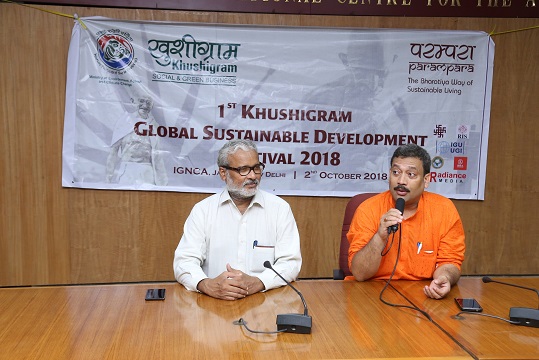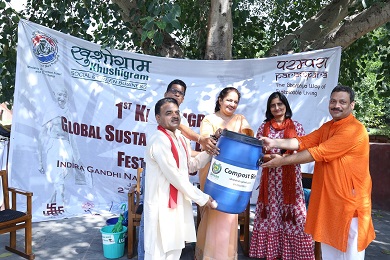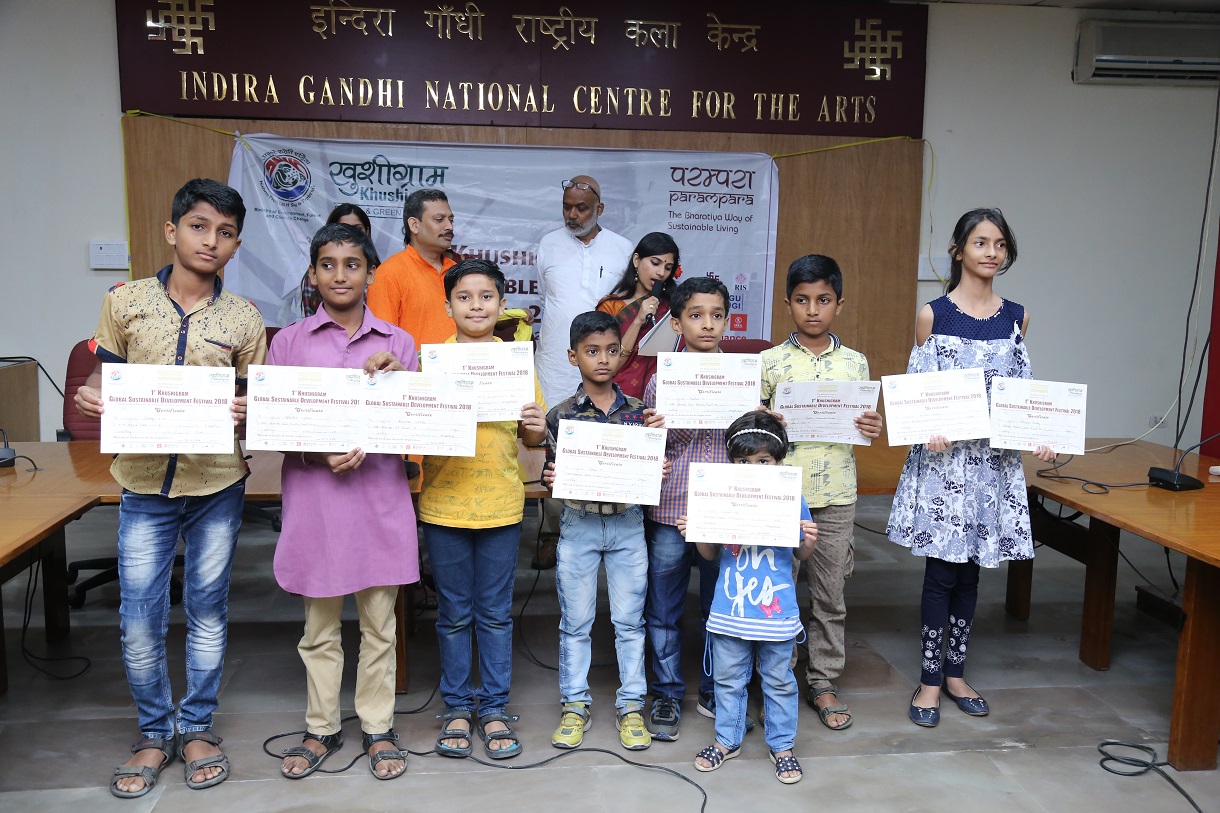2024 UN Civil Society Conference starts at Nairobi
UN Deputy Secretary General declares 2024 UN
Civil Society Conference a Testament to the Strong Voice of Civil Society
The two day 2024
UN Civil Society Conference started today at Nairobi. Bringing together
representatives of civil society, government representatives, senior United
Nations officials, youth changemakers, academia, other stakeholders and media,
the United Nations Civil Society Conference is the premier event on the civil
society calendar at the United Nations, ahead of the Summit of the Future.
Organized by the
United Nations Department of Global Communications, the Conference will run for
two days over May 9 and 10 at the United Nations Office at Nairobi. It
has attracted strong interest, with over 3000 expected to attend, representing
mainly civil society representatives, governments, United Nations entities,
international governmental organizations and other stakeholders.
In
opening remarks, Maher Nasser, Co-Chair of the Planning Committee
of the 2024 Civil Society Conference, Director, Outreach Division, United
Nations Department of Global Communications and Master of Ceremonies, said
last week’s heavy rains and flooding had left death and havoc across Kenya and neighbouring
countries; extreme weather conditions once again demonstrated that the impact
of climate change was harming those least responsible for creating the climate
crisis.
Nasser extended
deep condolences to the victims, and solidarity with the impacted
communities. The Department of Global Communications had never organized
a conference of this size, which had attracted such a high level of interest,
in such a short period of time. Over 3,600 civil society representatives
from 2,750 entities had registered, along with around 400 representatives of 64
governments, seven International Governmental Organizations (IGOs), 37 United
Nations entities and over 100 media reporters. 70 percent of those
registered were from Africa and 40 percent of all registrations were youth, in
the age group 18 to 34. He hoped the expectations from the Conference
would be achieved.
Nasser thanked the Director General for welcoming the idea
of the Conference in Nairobi, when he had first proposed the idea in April
2023. He also thanked the European Union, the Government of Denmark, the
Ford Foundation and the United Nations Foundation for their financial support,
the United Nations Office at Nairobi and the other United Nations entities for
hosting the Conference, and the civil society partners who had worked with the
team as part of the planning process.
He also
acknowledged the presence of the co-facilitators of the Pact for the Future,
the Global Digital Compact and the Declaration on Future Generations, the
Office of the President of the General Assembly and the Our Common Agenda team,
and other senior leaders from across the United Nations system.
Zainab Hawa Bangura, Director General of
the United Nations Office at Nairobi (UNON), warmly welcomed everyone to
the environmentally friendly UNON complex where the greening the blue
initiative had come to life. In the context of the heavy floods which had
ravaged Kenya, Bangura extended the Secretary General’s message of support and
condolences to those affected. The UN and their partners were working
closely to address humanitarian needs. UNON was the only UN headquarters
in the global south, and was honoured to host the 69th Civil Society Conference
in Nairobi, which was the first time it had been held in Africa. The
Conference provided a unique opportunity for civil society and
multi-stakeholder engagement; it was a vital prelude to the world leader’s
summit of the future.
Civil society
played a fundamental role in shaping a future, which today more than ever,
needed multilateral approaches. As a former civil society leader, Bangura
understood the vital role civil society played around the world. She
encouraged all delegations to make their voice heard. UNON remained a key
partner supporting UN operations globally and was a trailblazer in sustainable
work. UNON was undergoing a historical transformation that would boost
the journey towards energy, neutrality and bio-diversity. Two key capital
construction projects, including the construction of six new office blocks, and
the upgrade of conferences facilities with a combined value of 340 million dollars,
represented the most significant UN infrastructure project in Africa. In
closing, Ms. Bangura thanked member states and acknowledged the Kenyan
government’s continued collaboration towards infrastructure developments.
Over 80 percent
of Conference registrants reported working with vulnerable groups. Over
60 percent of registrants identified as Human Rights Defenders. Climate
was the top issue for youth registrants. Those over 35 years old
identified gender as the top issue. The third most identified topic of interest
was youth and children. It was important to remember that today was
yesterday’s tomorrow and last year’s future. Mr. Nasser asked; what
lessons could be learned from not paying attention to issues which had come to
haunt us? Carbon and greenhouse gas emissions; climate change.
Income inequalities and persistent gender inequalities, selective application
of the rule of law and the resulting erosion of the universality of these
concepts. Civil Society was the embodiment of the opening words of the
Charter of the United Nations, “We the Peoples of the United Nations”. It
was important that civil society did not waver in their advocacy and actions to
hold everyone in power accountable. In keeping with tradition, Nasser
concluded and handed over to the Co-Chairs to deliver their opening remarks.
Carole Agengo, Co-Chair
of the Planning Committee of the 2024 Civil Society Conference, Global
Initiatives Lead & Africa Regional Representative at HelpAge International,
welcomed all Conference participants to Nairobi, and expressed her solidarity
with those affected by the devastating floods. The UN Civil society
conference had made its first stop in the global south. While this was
positive, the reality represented the underlying inequality and lack of
inclusion.
Civil society
in the Global South had faced challenges in accessing previous conferences for
various reasons, most predominantly, due to visas. Reflecting on this,
the Conference had established a premium on inclusion and participation.
Ten diverse subcommittees had been established, which further conceptualized
the inclusivity in the objectives to level up inclusion, impact, and
innovation. Today and tomorrow, there would be inclusive workshops,
covering a broad range of issues and themes, organized by organizations from
across the globe. Yesterday, a successful youth activation local
mobilization day had been held, where 400 people from across the country had
participated.
In closing, Agengo
reflected on two African proverbs: “it was only by the strength in their
numbers that the ants in the field can carry their prey to the rest; and “when
hunger strikes a country, no one is spared.” With these in mind, it was
vital for organizations in the Global South to unleash the power in their
numbers and collaborate, as they moved forward towards the Summit of the
Future.
Nudhara Yusuf, Co-Chair
of the Planning Committee of the 2024 Civil Society Conference, Global
Governance Innovation Network (GGIN), Executive Coordinator at Stimson Center,
Youth Coordinator, Coalition for the UN We Need, said she stood in
solidarity with those in Kenya who had suffered from recent flooding, and was
reminded every day that the lowest hanging fruit from Conesus was the need for
change. Ms. Yusuf quoted a saying in Damu, which meant “every country is
the people’s country, and every people are our peoples”, and expressed
gratitude to those who had organized the Conference. The meeting aimed to
meaningfully support the Summit of the Future, which was a critical moment.
In the Summit, civil society would ask member states to raise the bar on
multilateralism. In turn, civil society needed to be willing to push the
envelope on how they engaged with multilateral and intergovernmental
processes. This notion was present in every ounce of the organized chaotic
glory which was about to unfold. The Conference would host 20 impact
coalitions, 50 exhibits, an intergenerational hub, a media zone and much
more. Yusuf concluded by wishing everyone an enjoyable Conference. She
hoped this was the start of the story of what happened next; a story of
inclusion, innovation and impact.
Amina
Mohammed, Deputy Secretary General, Executive Office of the Secretary General
(EOSG), speaking via video message, expressed her deep condolences to the
victims of the devasting floods in Kenya, reiterating the United Nation’s
continued commitment to supporting the Government of Kenya during this
challenging time.
Mohammed also
reiterated the Secretary General's call for an immediate ceasefire in Gaza, the
release of all hostages and safe and unimpeded access for humanitarian aid. ‘We
the Peoples’, the powerful opening of the United Nations Charter, was a
commitment to come together for the benefit of all peoples. Every day, civil
society groups around the world worked tirelessly to advance the goals of the
United Nations, through their fight for global, social and climate justice, and
for peace, gender equality and human rights. The Conference was a
testament to the strong voice of civil society, despite rising threats and
shrinking space. It also reaffirmed that the upcoming Summit of the Future
needed to resonate with their priorities, their concerns, and their
expectations. September’s Summit was a generational opportunity to update
international institutions and build a more inclusive multilateralism that
served the interests of all peoples. But that opportunity could only be seized
with active engagement. Between now and September, civil society’s views
and active participation were needed.
Mohammed urged
civil society fully engage with Member States and Leaders in New York and in
capitals; to join forces with civil society colleagues across regions and
causes; to connect the changes needed in multilateralism with the changes
people needed to see in their daily lives; and to make their voices
count.

















